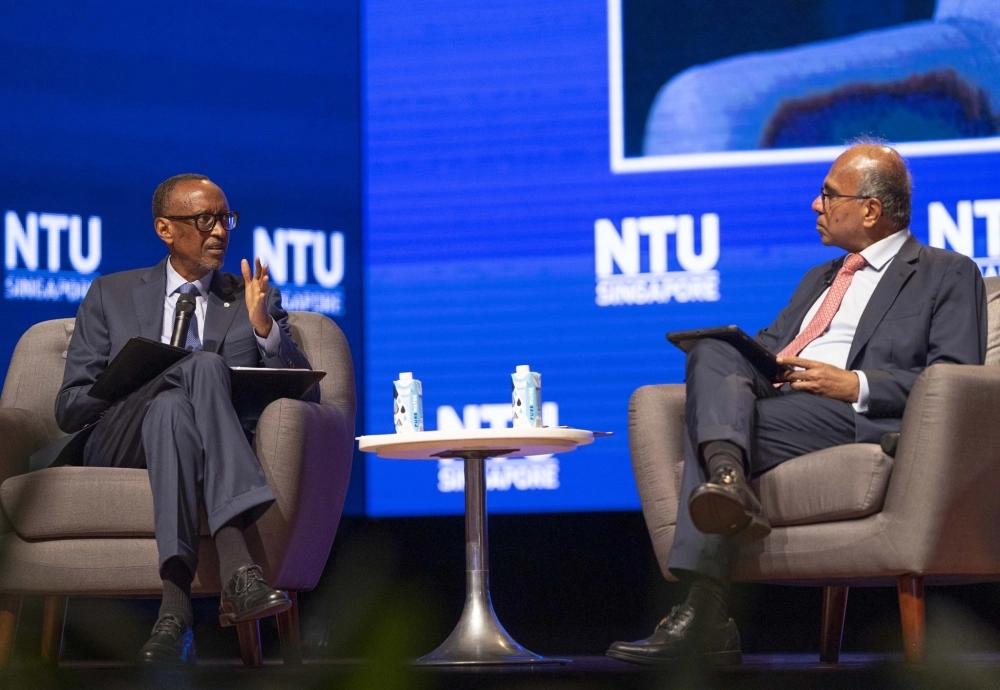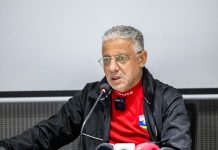Africa-Press – Rwanda. Rwanda still has a long way to go, but the country has been fundamentally transformed for the better.
President Paul Kagame told a packed audience at the Nanyang Auditorium on Friday September 30, as he delivered the Majulah Lecture, in Singapore.
The head of state is on a 3-day working visit to the country, as part of the efforts to deepen bilateral ties.
The Majulah Lecture is an NTU platform for leaders from both the private and public sectors to share their thoughts and ideas on campus.
In his remarks, Kagame said he considered the invitation to deliver the lecture a particular honour, because the title is drawn from Singapore’s national anthem.
Locally, Majulah is a call to progress, to move forward, together and united- in other words, to innovate but inclusively.
“I cannot presume to know all of the circumstances that led Singaporeans to choose these sentiments for the national anthem. But the words resonate.
“It is therefore fitting to say a few words about the relationship between innovation and continuity, in the context of Rwanda’s unique journey over the last 28 years,” he added.
Tragic history
In 1994, Kagame said, Rwanda had basically ceased to exist as a nation.
He said, a million people lay dead, out of a population of around seven million, because of a perverted genocidal ideology. Millions more were refugees. Every public institution had been destroyed, and the national treasury was looted.
“To most observers, all that Rwandans could aspire to, in the generation which followed that tragedy, was simply to survive. Charting a pathway to prosperity seemed like a preposterous dream.”
However, Kagame shared that despite a dark history; Rwanda has found her way forward by innovation through home-grown solutions in three key areas.
Investing in national unity
To begin with, the head of state pointed out that there was need to innovate around national unity and social cohesion.
“We started by creating security, because that is the basis for anything else to happen. We also immediately initiated the process of merging the liberation army with the defeated army of the former government.”
According to him, a country without a shared national identity has no future.
Rwanda’s historic unity had been progressively corrupted by the previous colonial and post-independence governments, he stated.
“We restored a traditional practice where a monthly community service brought all citizens together to improve their neighbourhoods. We released genocide suspects back into their communities, where they were judged through a process called Gacaca, that focused both on punishment and on bringing the truth to light. This was important for survivors and perpetrators to be able to live together again,” he added.
The government also focused on equipping young Rwandans with a positive concept of citizenship that emphasises what is shared by all rather than what divides them.
“As a result, today, independent polls find that Rwanda has some of the highest levels of social trust in the world.”
Equal rights, treatment
Also, key in the past 28 years, was the choice to innovate in techniques of inclusive, citizen oriented governance.
Weighing in on the past, Kagame said that public institutions and assets were treated as the property of a few, adding that this went as far as even to study at secondary school being a privilege afforded by those with political connections.
“But whenever citizens do not enjoy equal rights and treatment, a country’s stability is at risk. This is why we strive to establish a culture of meritocracy, where every young Rwandan knows that hard work and excellence will bring rewards, regardless of background,” he said.
One practice that has become a habit in Rwanda is the signing of ‘imihigo’ by leaders at different levels of government, he asserted.
‘Imihigo,’loosely translated as targets, are performance contracts that specify what is to be delivered and how to measure it.
Kagame explained that it is one of the tools the government has adopted to encourage citizens to be fully involved in holding the government to account.
“The practice is simple but powerful, and also affordable.”
Innovation and technology
In the late 1990s, the government decided to make internet access and digital skills a keynote of our economic strategy, Kagame told an audience mainly composed of NTU’s management and students.
He added that there was even pushback from some partners, the donors, at the time, who thought that technology was a luxury for a poor country.
Fortunately, President Kagame stressed, “we persisted, and today services are the fastest-growing segment of the Rwandan economy, largely building on those infrastructure and training investments.
“All public services, such as obtaining birth certificates or paying tax, are now done online, via a platform called Irembo, which is largely designed and operated by Rwandan professionals.”
Since the pandemic, like Singapore, Rwanda is working to become a vaccine and medicines manufacturing hub.
And by next year, he said, the first end-to-end mRNA manufacturing facility in Africa will be launched by the German company BioNTech, in Kigali.
But, he said, there was another reason we decided to make technology and innovation a centrepiece.
He explained that with technology comes the connection to the wider world, especially young people. He also said that it helps build openness and curiosity, an important move for Rwanda as she tried to work to overcome the divisions of the past.
What connects these three types of innovation that made a difference on Rwanda’s journey is the importance of mind-set change, he reiterated.
“From closed, to open. From dependent, to self-reliant. Above all, to have the confidence to just be our best selves, as Rwandans and as Africans, rather than trying to copy or imitate others,” he said.
Rwanda, Singapore are like-minded
Innovation is necessary for human survival, for example with the urgent energy and food production challenges.
“It is, incidentally, why Singapore’s story of building a successful society continues to have a wide meaning. It was achieved by investing in people, making good policy choices, and holding each other accountable for results.”
Kagame observed that it was not an automatic process that can be taken for granted.
This means that a rapid rise to high income status is a goal that other nations can also aspire to, and achieve, no matter their starting point, he added.
“We are very happy to have a number of dynamic young Singaporean entrepreneurs living and working in Rwanda, and making important contributions. We therefore look forward to much more collaboration and partnership with Singapore, and other like-minded nations and institutions,” Kagame said.
The head of state’s visit to Singapore comes at a time both countries boast of cordial bilateral ties.
Singapore is also Rwanda’s largest trading partner in the world, with approximately $150 million worth of foreign direct investments made by Singapore companies in Rwanda.
In June, the Singaporean Prime Minister was in Rwanda for the 26th Commonwealth Heads of Government Meeting (CHOGM). At the time, he committed to more exchanges between both countries that are directed to deepening relations between the two countries and peoples.
For More News And Analysis About Rwanda Follow Africa-Press






